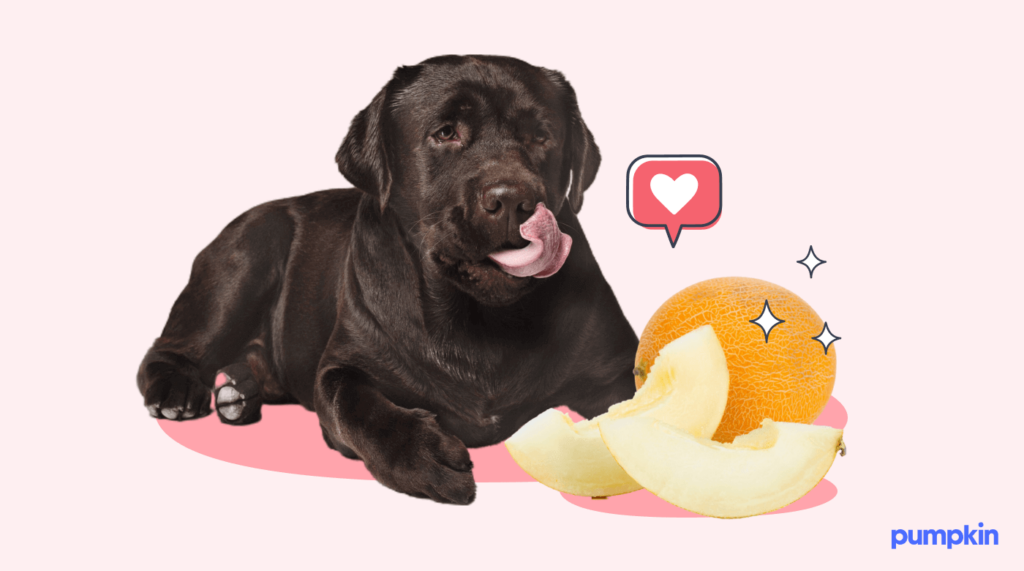Key Points:
- Yes, dogs can eat cantaloupe, but it should be served in moderation.
- Cantaloupe is a good source of vitamins A, B6, and C.
- Remove the rind and seeds of the cantaloupe before feeding it to dogs.
To your pooch, keeping the fruit salad to yourself feels like the ultimate betrayal. With those big, begging eyes, they’re saying, “If you don’t share that juicy slice of cantaloupe, then are we really best friends?” And since melon is the worst part of any fruit salad, there’s no harm in sharing, right?
Fortunately, you don’t have to break your pup’s heart. When served in moderation, dogs can eat cantaloupe safely.
Keep reading to learn more about the nutritional value of cantaloupe for dogs and what to do if your dog gets sick from eating too much.
Cantaloupe is safe for dogs
Cantaloupes are absolutely safe for dogs. These juicy fruits are a perfect fit for hot weather, as they’re low in calories and have a high water content for a quick hydration boost. (See also: watermelons.)
Dogs can enjoy the nutritional benefits of cantaloupes, too — but it should still be served in moderation. Small pieces are usually safe when given as an occasional treat.
The inner flesh can be served fresh in bite-sized portions. However, the rinds are tough and should always be removed first.
While cantaloupe has nutrients such as fiber, vitamin B6, and vitamin C, it also has a lot of natural sugar. If your dog has obesity or diabetes, your vet may recommend avoiding this fruit.
Can puppies eat cantaloupe?
Many young pups will eat anything within reach. The good news is that cantaloupe isn’t toxic and can be a safe treat for puppies who are already eating solid food.
Keep in mind, pups have sensitive stomachs. They also have specific dietary requirements, so it’s best to wait until they are at least 7-10 weeks old.
How much cantaloupe can dogs eat?
Cantaloupe contains a lot of natural sugar, so keep this as a “sometimes” snack. For all dogs, a good rule of thumb is to keep treats to only 10% of their daily calories. The right serving size will be based on their size and weight. Unless you have a large dog, a few small cubes or melon balls are more than enough.
If your dog overeats this fruit, they may experience stomach upset, diarrhea, or vomiting from the sugar and fiber overload.
What are the health benefits of cantaloupes for dogs?
Cantaloupe is a low-calorie, high-fiber fruit filled with a range of nutrients:
- Vitamin A: supports the skin, bones, and eyesight
- Vitamin C: boosts the immune system, slows disease, and improves the skin
- Powerful antioxidants: fight cell damage and maintain good overall health
- Potassium: supports the function of the nerves and muscles
- Folate: aids in red blood cell production

The high water content and dietary fiber found in cantaloupe also promotes healthy digestion, reducing the risk of constipation and dehydration.
What are the risks of cantaloupes for dogs?
Before you serve this delicious fruit to your pup, there are a few things to consider.
For example, large chunks of cantaloupe can be a choking hazard for any dog — especially in smaller breeds. Cut chunks of melon into bite-sized pieces and remove the rind to reduce this risk.
The high sugar content in cantaloupe can also harm your dog’s teeth. It can also cause issues for pets with diabetes or obesity.
Cantaloupe is packed with fiber, which is beneficial. However, too much can cause diarrhea in dogs as well as other stomach issues. Signs your pet has gone overboard with the cantaloupe may include excess gas, stomach cramps, and vomiting.
Signs of cantaloupe allergies in dogs
No two pups are the same, and in rare cases, your dog may have an allergic reaction.
Some of the signs include:
- Skin irritation, itching, and redness
- Facial swelling
- Difficulty breathing
- Digestive issues
If you notice anything unusual, check in with your veterinarian. Even if your dog has never had a bad reaction to fruit before, food allergies can develop over time.
How to feed your dog cantaloupe
Before giving cantaloupe to your dog, remove the rind and scoop out the seeds. You can store any leftover cantaloupe in an airtight container in the fridge for up to 5 days.
Here are a few serving suggestions your pooch will love:
Hand-fed pieces: Offer cantaloupe cut up into small pieces. It will be a hydrating snack on hot summer days or when your dog needs a healthy treat.
Smoothies: Try mixing this melon with other fruits like strawberries, mango, apricots, and plain (xylitol-free) Greek yogurt. This makes a refreshing doggy smoothie.
Nutritious sorbet: Pureed and frozen cantaloupe make a great pup sorbet. Add a few blueberries and cranberries, or dog-friendly veggies like spinach and green beans, for a pup-worthy snack loaded with healthy antioxidants.
Sliced icy melon: Remove the rind and seeds and thinly slice the cantaloupe. Freeze the melon slices an airtight container for a chewy summer treat.
What other fruits can dogs eat?
There’s a long list of pup-friendly fruits you can share. You can also check Pumpkin’s “Can My Pet Eat That?” cheat sheet.

Here are some other healthy fruits you can share with your dog:
- Watermelon: Watermelon is another low-calorie, hydrating fruit full of fiber, potassium, and vitamins A, B6, and C. It also has a high water content.
- Pineapple: Pineapple is safe to feed to dogs in small doses. It’s loaded with vitamins and minerals including magnesium, potassium, and vitamins C, A, and B6.
- Strawberries: What’s in a strawberry? Loads of pup-friendly nutrients, like vitamin C, potassium, magnesium, and folate.
- Bananas: One of the key nutrients that dogs (and their humans) get from eating bananas? Potassium.
- Blueberries: Blueberries have antioxidants, vitamin C, vitamin K, calcium, and more. They’re also naturally bite-sized and low in sugar compared to other fruits.
The verdict: Can dogs have cantaloupe?
Cantaloupe is a summery treat with a sweet flavor and plenty of health benefits. It’s a versatile melon that humans can eat fresh, add to a fruit salad, mix into a daiquiri — or share with a four-legged friend.
As long as it’s prepared correctly, you can safely share a slice of cantaloupe with your favorite pooch. That means removing the skin and seeds and cutting the melon flesh into bite-sized pieces. Also be mindful of portion control because this fruit is particularly high in sugar.
Remember, not all dogs are the same, and your pet may have a bad reaction when eating new foods. Learn more about how Pumpkin pet insurance plans can protect your pup (and your wallet) by covering a portion of the cost of future eligible vet visits.
FAQs
- https://www.vet.cornell.edu/departments-centers-and-institutes/riney-canine-health-center/canine-health-information/how-long-should-puppies-stay-their-mother
- https://www.akc.org/expert-advice/nutrition/how-many-treats-can-dog-have/
- https://www.verywellfit.com/cantaloupe-nutrition-facts-calories-and-health-benefits-4110083
- https://discover.texasrealfood.com/food-shelf-life/cantaloupe
- https://www.petmd.com/dog/centers/nutrition/evr_multi_importance_of_antioxidants_in_pet_food
- https://www.akc.org/expert-advice/nutrition/vitamins-dogs-need-healthy-lifestyle
- https://www.petplate.com/blog/puppy-thanksgiving-a-guide-to-sharing-human-food-with-your-pooch/
DISCLOSURE




